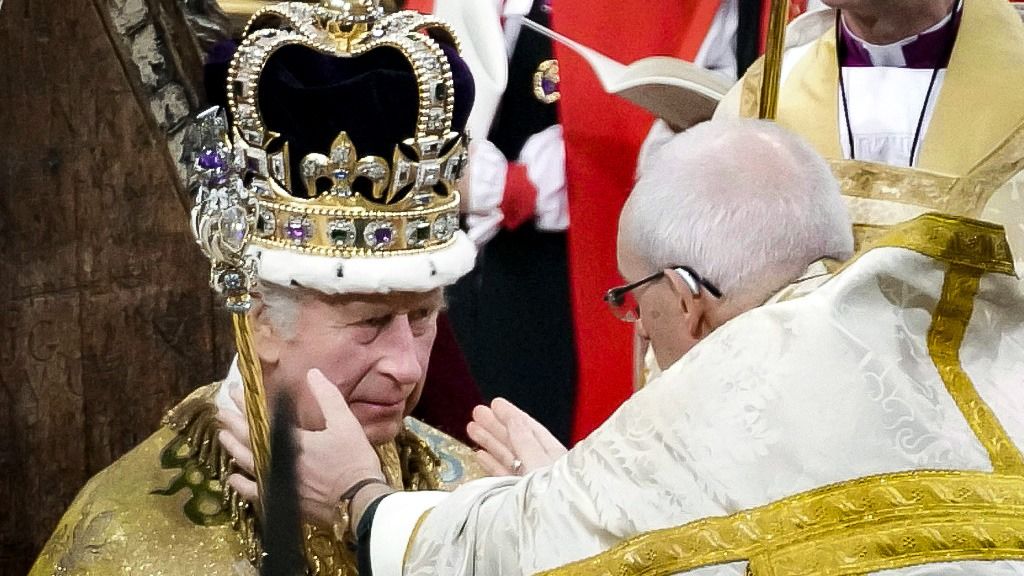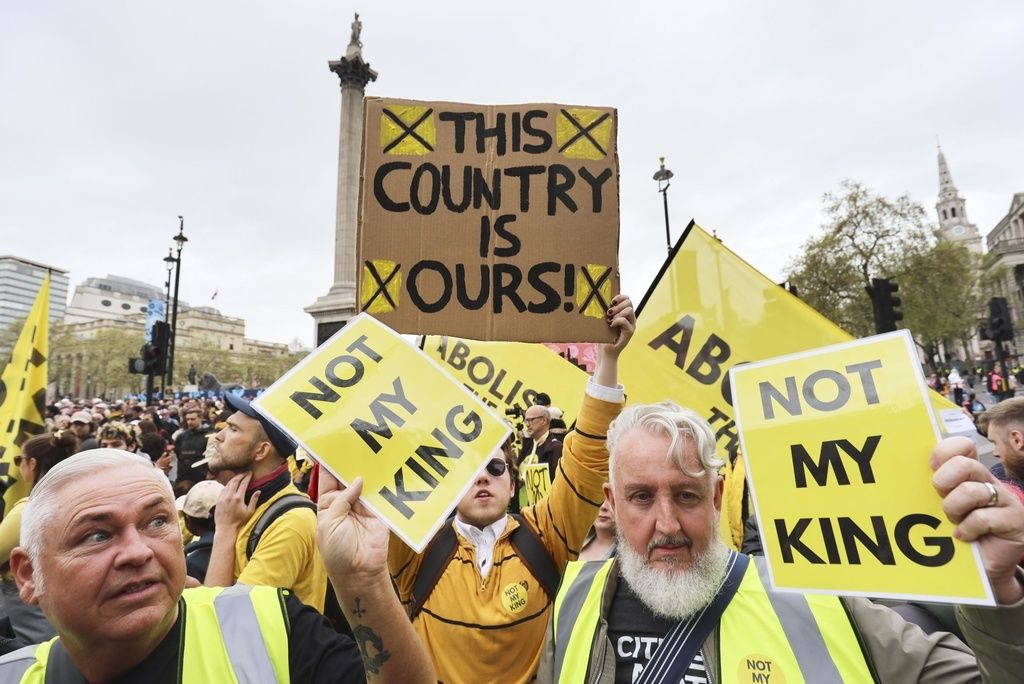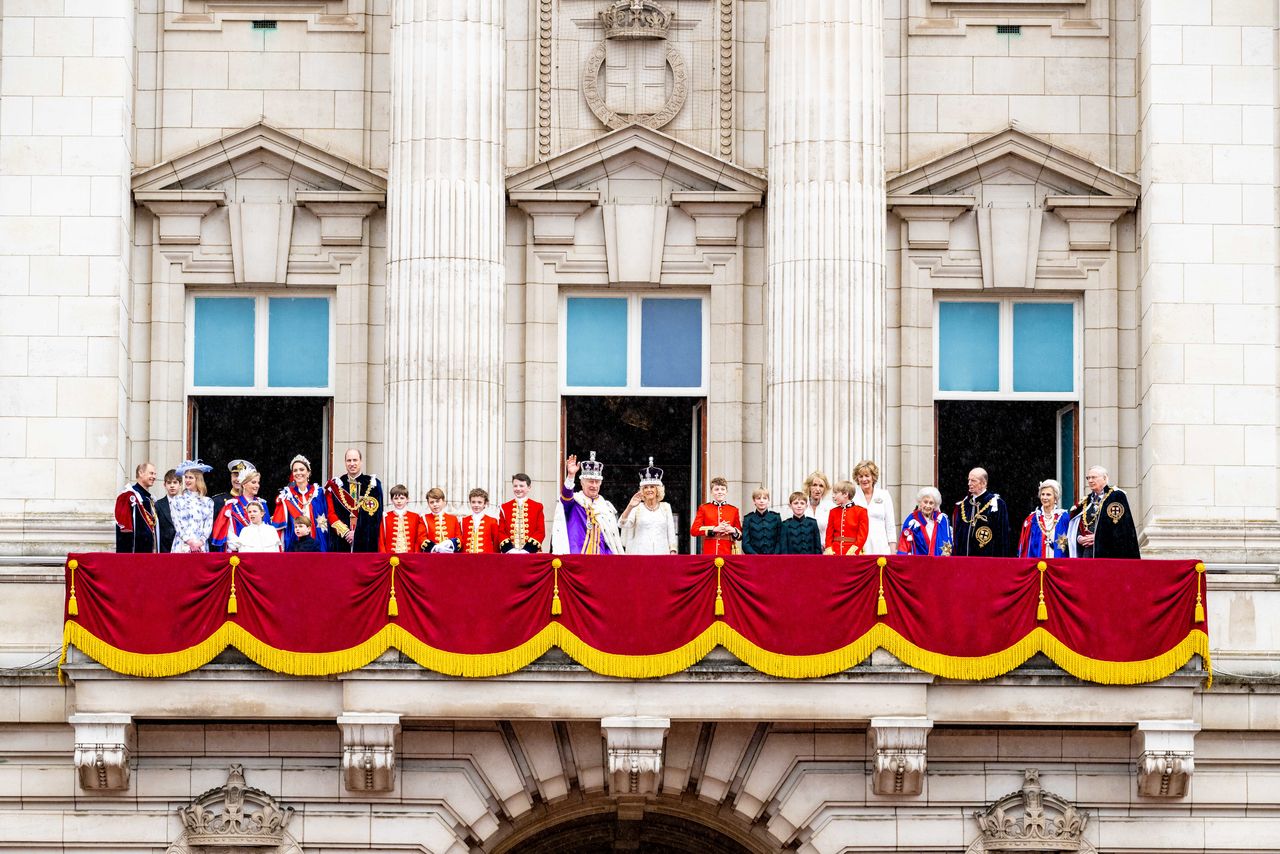
Apathy Rules: Indifference an Issue for Britain’s Royals and Japan’s Imperial Family
Politics Imperial Family Society- English
- 日本語
- 简体字
- 繁體字
- Français
- Español
- العربية
- Русский
“Not My King”
On May 6, 2023, there was a festive mood in central London for Britain’s first coronation in 70 years. The parade route along which King Charles III would travel was lined with citizens waving Union Jacks.
At the same time, a group of protesters carried yellow placards bearing the words “Not My King,” in an expression of dissent that led to some arrests. They were part of an organization called Republic that advocates for the abolition of the monarchy and has some 10,000 members.

Protesters at the coronation ceremony for King Charles III in London. (© Kyōdō)
Britain has been in the middle of a cost-of-living crisis since the end of 2021, fueled by inflation, the COVID-19 pandemic, Brexit, and the Russian invasion of Ukraine. Republic criticized the exorbitant nature of the coronation at a time when so many citizens were suffering. Could this viewpoint find support, broadening the country’s anti-monarchist movement?
Professor Kimizuka Naotaka, who specializes in the British royal family, says, “It wasn’t reported in Japan, but there was the same kind of movement at the time of the coronation of Queen Elizabeth II, 70 years ago. In every country with a sovereign leader, there are people who want to abolish the system and introduce a republic, but at this time, more than half of the British people support the royal family, and Republic, with its small membership, should not be overestimated. However, there is a more alarming issue than the antimonarchist movement—the increasing indifference felt for the royal family, particularly among young people.”
Growing Apathy
Results of a survey by the British organization the National Center for Social Research released in April, shortly before the coronation, found that only 29% of respondents said the monarchy is “very important,” while 26% said that it is “quite important.” By contrast, 20% thought that it is “not very important” and 25% “not at all important.” This represents the lowest level of support ever.
The British research firm YouGov found in an April survey that 64% of the country’s people had little or no interest in the coronation. This trend was higher among the young, reaching 75% for those aged 18–24 and 69% for those aged 25–49.
Even the viewing figures betray growing apathy. The BBC reported that 18.8 million people watched the event on television, or around 28% of the population. Given that 27 million tuned in to TV coverage of the coronation of Elizabeth II 70 years ago, a simple comparison shows the diminished interest. There were also 28 million television viewers for the queen’s funeral last autumn, or more than 40% of the population, which also suggests less enthusiasm for Britain’s new monarch.
Reasons for Unpopularity
Kimizuka believes changes in education have fostered new attitudes. “Margaret Thatcher, who was prime minister for 11 years from 1979, promoted her brand of Thatcherism to turn around the faltering British economy. This created a competitive society in which the attitude was that people who work hard get rewarded, while the lazy will struggle to get by. Previously, education encouraged deference to the royal family, but in the changed times, citizens came to believe that the royal family was not inherently great, and they would only appreciate those members who made efforts for the country and its people.
“Respect for the royal family decreased and the children of that generation raised today’s young people, among whom a growing number show no respect for or interest in the royals,” notes Kimizuka. “These young people’s lives have become increasingly difficult due to the soaring inflation following the outbreak of war in Ukraine, so they want the government to take firm action to deal with that.” Thus, the royal family faces more critical eyes, and young people in particular do not see the monarchy as an institution to rely on.

The British royal family gathers after the coronation on the balcony at Buckingham Palace in London. (© Dutch Press Photo/Cover Images, via Reuters Connect)
Among the reasons King Charles III has struggled to win popularity, Kimizuka says: “Of course, the divorce issue with Diana plays a part. There are still many older British people who loved Princess Diana, and they won’t accept King Charles and Queen Camilla, who they see as having driven Diana out of the royal family through their adultery. Their lack of support combines with young people’s indifference, so Charles has lost a lot of public backing compared with Queen Elizabeth.”
Loss of Status
Following the coronation, 12 central members of the new royal family lined up for an official photograph. On either side of the royal couple were Charles’s eldest son Prince William, his sister Princess Anne, his brother Prince Edward, and other relatives. Notably absent were his second son Prince Harry, now living in the United States, and his brother Prince Andrew, who is under suspicion of sexually abusing underage girls. “This shows King Charles’s intention that these are the members who will perform official duties. The royal family shares patronage of around 3,000 charities and other organizations, including military associations, as well as those that work helping vulnerable people who have fallen through safety nets provided by the government,” Kimizuka explains.
“As the royal family is growing older, under normal circumstances, Prince Harry in the younger generation would support his father and brother as a working member. However, he left the country with his own family, and even released a tell-all memoir that created new discord with the royals and led to vilification among citizens, so he lost his status as a central royal family member.”
Risks in Japan
Britain’s royal family faces various issues, but the Japanese imperial family must also cope with rising indifference among the young. In September 2019, not long after Emperor Naruhito ascended to the throne, an NHK poll found that those who were very or somewhat interested in the imperial family accounted for 72%, ahead of 27% who had little or no interest.
However, despite this superficially positive data, the general trend showed that interest increased with age. Among those aged 18 to 29, a total of 9% were very interested and 40% somewhat interested, while 26% had little interest, and 25% none. “I think the problem of indifference is more serious in Japan than in Britain,” Kimizuka says.
“In particular, Japan’s young generation, who are needed to rally round the imperial family in the future, haven’t been taught about the emperor or his family, leading to greater indifference, and they have no idea about serious issues like the imperial succession. After Diana’s death, the British royal family reflected on the criticism it received from the British public, and came to post on social media used by the young to publicize its activities, and thereby survive. By contrast, no such measures to win over the indifferent have taken place in Japan. If citizens could see how hard the imperial family is working, there would certainly be voices saying that it must not be allowed to die away . . .”
Even in a strongly royalist country like Thailand, there has been a fervent movement for reform of its royal family following the death of King Bhumibol Adulyadej in 2016. While its own imperial succession is likely to be far off, Japan should learn from other countries’ experiences to avoid any trouble at that time.
(Originally published in Japanese on June 23, 2023. Banner photo: King Charles III of Britain is crowned by the Archbishop of Canterbury, Justin Welby, at Westminster Abbey on May 6, 2023. © Reuters/Kyōdō.)
